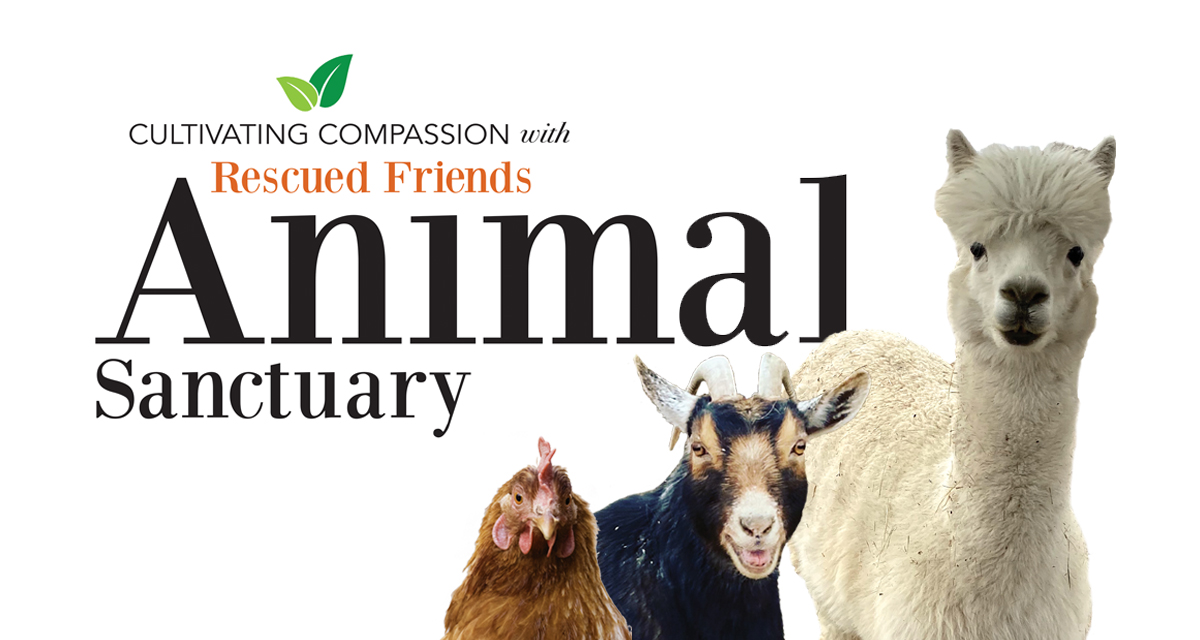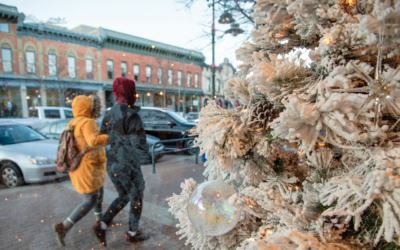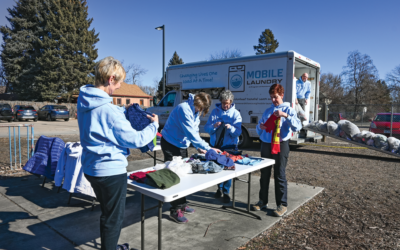by Dawn Duncan
One writer connects with a local nonprofit’s love of animals.
In 2016, nonprofit organization Rescued Friends Animal Sanctuary launched in Fort Collins. Rescued Friends, founded by Von Bortz and Amy Smith, was born out of a passion to promote a plant-based, vegan lifestyle that would demonstrate compassion towards animals by offering a comfortable, safe haven for those who have been abused, neglected, abandoned or are displaced.
The mission of the organization is rooted in education first and foremost; the interactions with animal residents providing a powerful learning tool to understand our deep connection to the animal world as we strive for healthy, humane ways of living. Rescued Friends residents are treated with top-level care. They’re given nutritious food daily, medical attention, play areas, free-range pens and running lots, and loads of attention.Slowly, the list of volunteer supporters of Rescued Friends has built through Volunteer Work Days, which are hosted periodically at the farm to introduce people to the residents and the organization’s ideals. My introduction took place in early February and I have been an avid supporter and volunteer since.
Being from rural Minnesota, I know what it’s like to be on farms. However, I grew up “in town,” which is a loose statement considering the town I was raised in has just over 800 people and still has no stoplights. It’s a remote spot in northwestern Minnesota with lush green hills, rivers, lakes and trees for miles, and expansive farmland as far as you can see. However, I had little experience actually working on a farm and had never cared for pigs, chickens or goats, only horses and domesticated pets.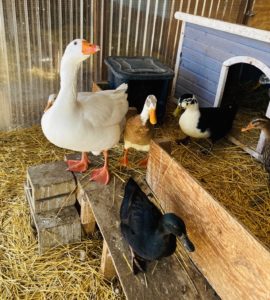
Day one at Rescued Friends wouldprove to be exactly the environment I had longed for, offering the chance to interact directly with the residents while embracing my belief in a vegan way of life. I found, while working in a live environment with animals that would typically be seen as food by many, my strong connection to animals deepened even more and fueled a new level of caring and personal belief that animals are our friends, not our food.
Approximately 30 of us arrived at noon that Sunday, with most of us being first-time volunteers at the farm. The veteran volunteers were selected as team leaders and I opted to be on “Team Pig,” following another Minnesota native, Morgan, as she showed us the barn area where buckets, rakes, shovels and wheelbarrows are kept. She gave us basic instructions and a few pointers on how to interact safely with the pigs. From there, Team Pig set out to make the pig sleeping chambers and fenced-in corrals as clean as possible.
The first residents I met were two huge hogs named Henry and Lulu, and Morgan offered sage advice when she said the two could be “rather spirited.” There was nothing to fear, just that these pigs were a bit sassy and playful, and also quite large. When we had mucked a full bucket and had it sitting in the center of the corral, Lulu proceeded to push it over with her snout then stand in front of us, waiting for our next move. While we removed blankets from the sleeping areas, Henry quickly chomped the end of the blankets, inciting a playful tug-of-war.
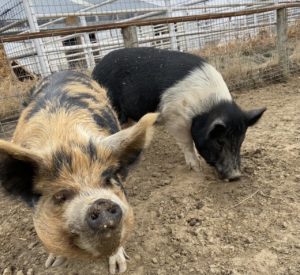
Other teams performed chores such as cleaning the Community Area, a large corral with sleeping quarters on the edge and play structures and feeding troughs that have been sturdily constructed by a contractor who donates his skills to the farm. Goats, alpacas and sheep roamed in this area, excitedly jumping about, leaping onto wooden lofts and offering friendly interaction.
Another area, King Arthur’s Court, included a special need pig named Arthur who is mobility challenged. Arthur, however, remains in good spirits each day, thanks to the care and feeding he is given. He has four pig roommates, potbellied pig sisters, that are also engaging and friendly, eager to interact with farm volunteers.
My two-hour shift went quickly. Once I was finished with all of the chores assigned, I had time to play with the animals and start learning their names. I was able to tour the farm and see the duck and chicken areas, pop by Sylvester the Turkey’s pen, and meet two of the farm cats, Butters and Felix. I explored the numerous barns and outbuildings, the new medical room and engaged with numerous sheep, goats and alpacas.
Farm work is not easy, and it waits for no one. Residents are used to being fed on a tight schedule morning and night, regardless of weather or circumstance. Consistency is key when working with animals and schedules are important. Also, volunteers need to have an open mind—and a willingness to help out and get their hands dirty.
Several events are hosted throughout the calendar year at Rescued Friends, although 2020 gatherings are postponed indefinitely at present, due to coronavirus outbreak concerns. Events such as Open Farms, Haunted Halloween Farm and potlucks are offered and eventually the farm would like to have regular cooking classes featuring plant-based recipes and techniques. The farm is 100% volunteer-run and relies on donor support.
In April, Rescued Friends launched theirfirst Hay Drive, where individual donors contributed $10 to cover the costs of hay to feed the farm’s animals. A small “latte level” donation goes a long way to ensure quality care for residents. Additionally, the farm offers the option to donate a set monthly contribution. All donations are tax-deductible.
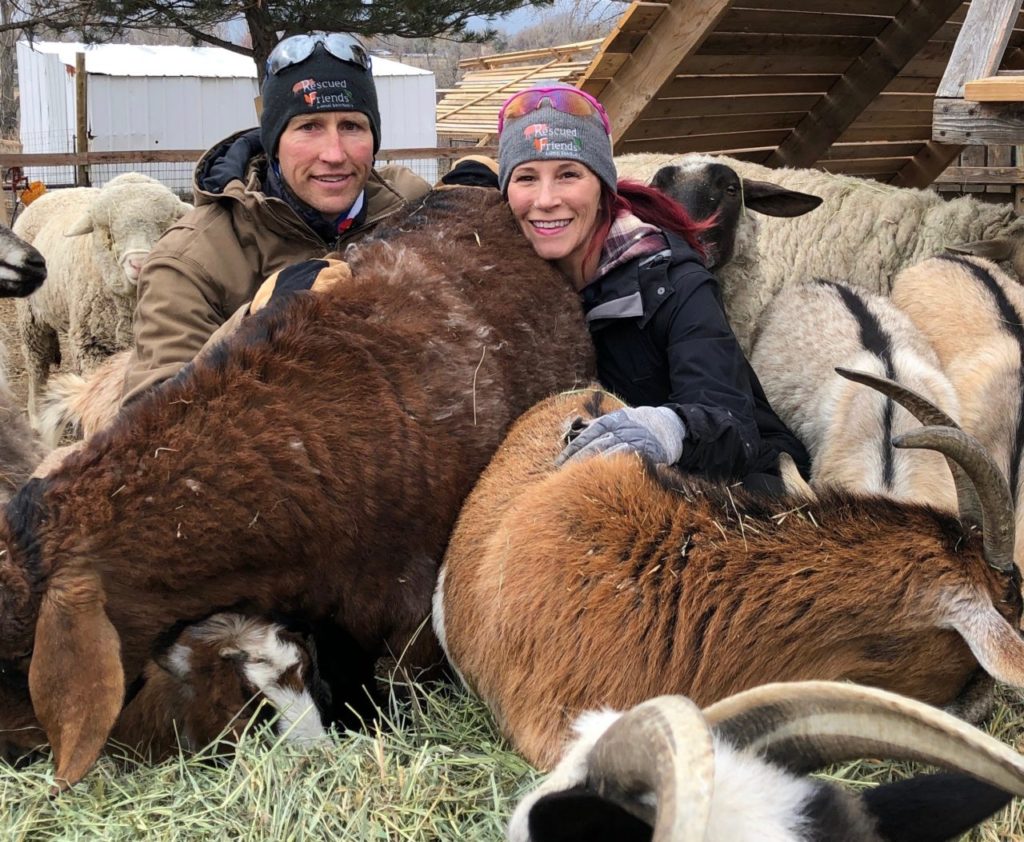 Von and Amy remain focused on their initial idea to create a space where they have a platform to live their values and engage others in their work. They stated, “Every day, we are faced with a choice: compassion or cruelty. If you could live a healthy life, enjoying good food that’s easy to make and benefits the planet and animals, why wouldn’t you choose that? Compassion over cruelty wins every time. The animals win, the planet wins and your health wins.”
Von and Amy remain focused on their initial idea to create a space where they have a platform to live their values and engage others in their work. They stated, “Every day, we are faced with a choice: compassion or cruelty. If you could live a healthy life, enjoying good food that’s easy to make and benefits the planet and animals, why wouldn’t you choose that? Compassion over cruelty wins every time. The animals win, the planet wins and your health wins.”
Animals at Rescued Friends are viewed as sentient beings and are given the best life possible. As I continue to volunteer and become immersed in this organization, it is clear to me the importance of educating the community on their work, as well as bringing awareness to this cause. Animals are truly a point of connection and one that runs right to our core for those of us who embrace it. They are guides to a way of life that allows us to find solutions to reducing environmental impact, improving our health and living in a way that promotes kindness to all beings.
For information, contact info@rescuedfriends.org or rescuedfriends.org, and follow @RescuedFriendsAnimalSanctuary (Facebook) and @rescued_friends_ (Instagram). Rescued Friends have stated they will inform the community via social media if they are able to hold any events later in the year.

